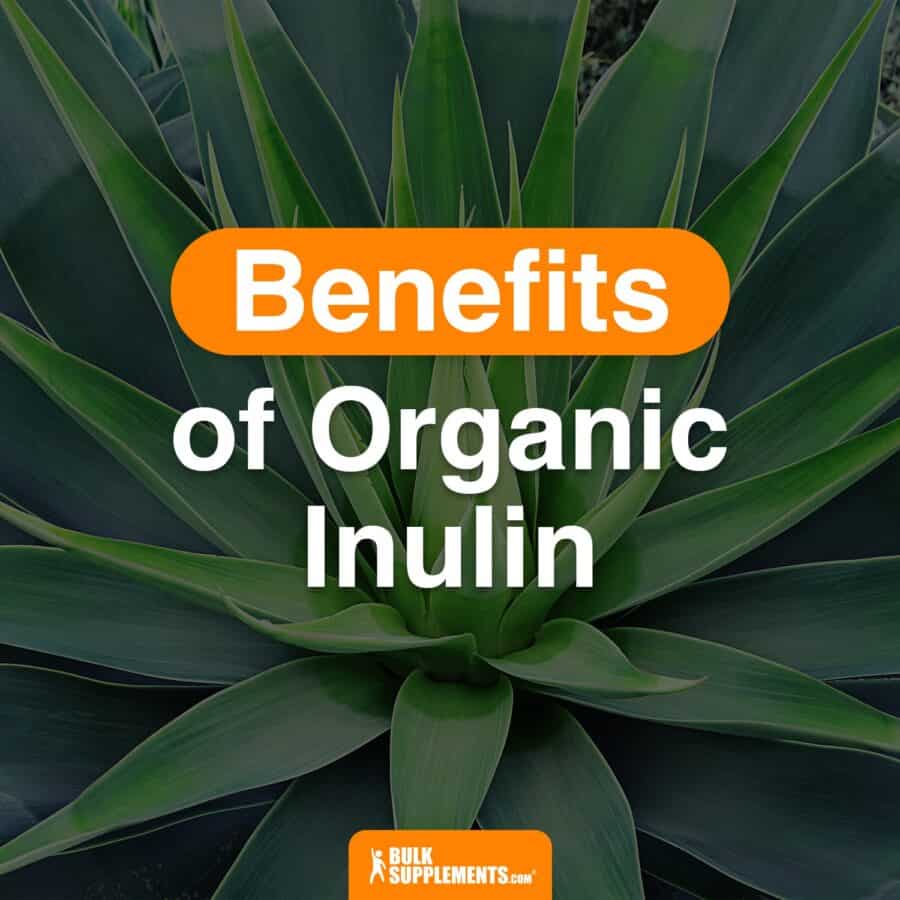Are you looking for an all-natural way to improve your digestive health? Look no further – organic inulin is a supplement that can help. Inulin is a natural dietary fiber found in plants such as chicory root and dandelion greens, which has been used for centuries to support digestive wellness. It functions by aiding beneficial bacteria growth in the gut while reducing the spread of unhealthy microbes. Plus, it’s easy to consume through supplements like capsules or powders, making it more convenient than ever before! This blog post will discuss how this ancient superfood can play a role in improving your overall health. Keep reading for more insights on what organic inulin can do for you!
What is Organic Inulin?
Inulin is a naturally occurring prebiotic fiber found in certain plants such as chicory root, artichokes, and Jerusalem artichokes. Organic inulin refers to the type produced without the use of pesticides, chemicals, or genetically modified organisms (GMOs). It’s a soluble fiber, easily dissolving in liquids which allows for it to be an easy addition to certain foods. Inulin is famous for its positive effects on gut health, and studies show it has been proven to promote the growth of beneficial bacteria in the gut.
The human digestive system is home to millions of bacteria, some of which are babies which can cause health problems such as digestive issues, allergies, and even mood disorders. On the other hand, some bacteria are considered “good” for us— and they’re the ones inulin helps boost. Bifidobacteria and Lactobacillus are two of the most beneficial types of bacteria in our digestive system, and inulin helps them multiply by binding to the food they feed on. By feeding the good bacteria present in our gut, inulin helps promote better digestion and reduces the risk of inflammatory bowel disease.
But why choose organic inulin specifically? The organic certification ensures that the inulin is free of harmful chemicals and pesticides, making it a healthier and more sustainable choice for your body and the planet. Choosing organic inulin can also help support small-scale farmers and promote sustainable agriculture.
Benefits of Organic Inulin
Aids Digestive Health
One of the biggest benefits of organic inulin is its role in digestive health. Inulin acts as a prebiotic fiber, which means that it helps to feed the beneficial bacteria in your gut. This promotes a healthy balance of gut bacteria, which can reduce digestive issues such as bloating and constipation. In fact, several studies have shown that inulin can help to improve the symptoms of conditions such as IBS.

Boosts Immune System
In addition to its digestive benefits, Organic inulin has also been shown to boost the immune system. This is because it acts as a prebiotic, which can increase the number of beneficial bacteria in the gut. These bacteria play a key role in immune function and can protect against harmful bacteria and viruses.
All-Natural Energy Boost
If you’re looking for an all-natural energy boost, inulin can help with that too. Because it’s a prebiotic, it helps to promote healthy digestion and nutrient absorption, which can lead to more energy throughout the day. And because it helps to keep you feeling full, you’re less likely to experience the energy crashes that come with consuming sugary or processed foods.

Natural Sweetener Alternative
Another great benefit of organic inulin is that it is a natural sweetener. It’s a great way to add sweetness to your meals or drinks without adding excess calories or sugar. Plus, unlike artificial sweeteners that can have harmful health effects, inulin has been shown to improve cholesterol levels and reduce the risk of heart disease.
Helps Control Blood Sugar
Organic inulin can also help to regulate blood sugar levels. It does this by slowing down the absorption of carbohydrates in the small intestine. This, in turn, helps to prevent blood sugar spikes after meals. As a result, inulin is particularly beneficial for people with diabetes or those who are at risk of developing the condition.
Supports Bone Health
Organic inulin has also been shown to support bone health. This is because inulin can increase the absorption of calcium in the body. Calcium is an essential nutrient for strong bones, and inulin can help to ensure that your body is able to absorb as much of this nutrient as possible.

Decrease Your Risk of Colon Cancer
For those that are looking to improve colon health, organic inulin is a fantastic choice. This powerful ingredient acts as a prebiotic, feeding the good bacteria in the colon, and ultimately reducing the risk of colon cancer. By adding just a small amount of organic inulin to your diet each day, you could significantly reduce your risk of this deadly disease.
Improved Mineral Absorption
Organic inulin has been shown to improve the absorption of vital nutrients such as calcium and magnesium. As these minerals are essential for healthy bones and many other important bodily functions, it’s vital to ensure you’re getting enough of them. This makes organic inulin a fantastic addition to your diet, especially if you’re vegan or vegetarian.
Promotes Weight Loss
If you’re looking to shed some pounds, organic inulin is an excellent supplement to add to your diet. It helps to suppress your appetite, making it easier to resist cravings and stick to your meal plan. Inulin also promotes the secretion of a hormone called glucagon-like peptide 1 (GLP-1), which helps regulate blood sugar levels and boost metabolism. This can help you lose weight naturally and safely. Inulin is a soluble fiber, which means that it helps to slow down the digestive process. This makes you feel fuller for longer and can help to reduce overall calorie intake. Additionally, inulin can also help prevent weight gain by supporting the growth of beneficial gut bacteria, which are linked to a healthy weight.

Higher Satiety
For those seeking to manage their weight, organic inulin can serve as a satiety booster. Studies show that inulin can slow down the emptying of the food from your stomach. As a result, you feel full longer, which means you can go longer without eating and potentially consume fewer calories.
Boost Mental Health
Studies have shown that organic inulin could have a positive impact on mental health. As this powerful ingredient feeds the good bacteria in our gut, it can help stabilize mood, reduce anxiety and boost overall well-being. So, if you’re looking for a natural way to improve your mental health, it’s definitely worth considering organic inulin.
Side Effects of Organic Inulin
Bloating
One of the most commonly reported side effects associated with organic inulin is bloating. When consumed in large quantities, inulin can draw water into the intestines, leading to feelings of discomfort and bloating. To minimize this effect, it’s a recommendation that you start with a small dose of organic inulin and gradually increase it over time, giving your body a chance to adjust.
Flatulence
Another potential side effect of organic inulin is flatulence. When inulin reaches the large intestine, it can be fermented by the bacteria that live there, which can release gas. This can be especially problematic for people with irritable bowel syndrome (IBS) or other gastrointestinal issues. If you’re concerned about this side effect, you may want to speak with your doctor before starting to consume organic inulin.
Laxative
Organic inulin is also known to have a laxative effect in some people. This is because it can increase the bulk and frequency of bowel movements. While this can be beneficial for people with constipation or other digestive issues, it can also be a problem if you’re not prepared for it. To avoid any issues, start with a small dose and pay attention to how your body reacts.
Allergic Reactions
In addition to these potential side effects, there have also been reports of allergic reactions to organic inulin. While this is rare, it’s important to be aware of the possibility if you have a history of allergies. If you experience any symptoms such as itching, hives, or swelling after consuming organic inulin, stop using it immediately and seek medical attention.
Interference with Medications
Organic inulin may interact with some medications, causing potential adverse effects. For example, inulin may reduce the absorption of antibiotics, leading to their reduced effectiveness in fighting infections. And, inulin may also affect the blood sugar-lowering effects of diabetes medications, leading to blood sugar imbalances. So, people on medications should consult their healthcare provider before consuming foods/supplements containing inulin.
High Caloric Content
Although inulin has very few calories, the foods or supplements containing this prebiotic fiber may still be high in calories. This is particularly true for inulin-rich snacks, like protein bars and granola, which can be high in sugar, unhealthy fats, and calories, negating its health benefits. So, if you’re consuming foods that contain inulin, make sure to check the nutrition label and choose products that are low in calories, sugar, and fat.
Not Suitable for Everyone
Even though organic inulin is promoted as a natural and safe ingredient, it may not be suitable for everyone. Pregnant and breastfeeding women, children, and people with specific medical conditions like intestinal blockage, inflammatory bowel diseases, or fructose intolerance should avoid consuming inulin or products containing it.
Is Organic Inulin Safe?
Organic inulin is simply inulin that has had extraction from organic agave plants. The extraction process involves taking the juice from the agave plant and heating it until the sugars caramelize and become concentrated. The resulting syrup contains inulin as well as other sugars. Organic inulin is a great alternative to sugar due to its low glycemic index and low caloric content.
Organic Inulin vs Inulin
First, let’s look at how organic inulin and inulin are different. Organic inulin, also agave inulin, is an extract from the blue agave plant. It has a mild, sweet taste and is in use as a natural sweetener. On the other hand, inulin from chicory root is an extract from the root of the plant and has a more neutral taste.
In terms of their health benefits, both organic inulin and inulin are famous for promoting digestive health. They’re prebiotics, which means they feed the good bacteria in your gut. This can help improve digestion, boost your immune system, and reduce inflammation in the body.
However, organic inulin has one advantage over inulin. It’s a low glycemic sweetener, which means it won’t cause a spike in blood sugar levels like regular sugar would. This makes it a great choice for people with diabetes or anyone looking to cut back on sugar.
Another benefit of organic inulin is that it’s a great source of fiber. Just one tablespoon of organic inulin contains about 3 grams of fiber, which is about 10% of your daily recommendation intake. Fiber is important for regulating digestion, keeping you feeling full, and reducing the risk of certain diseases like heart disease and cancer.
Lastly, it is a great alternative for anyone looking to cut back on calories. It’s low in calories and can be used in place of sugar in many recipes, making it an excellent choice for anyone watching their weight.
Organic Inulin vs Organic Psyllium Husk
Organic inulin and organic psyllium husk both offer several benefits for digestive health. Choosing one over the other depends on your specific needs and preferences. If you’re looking for a prebiotic that can help feed the good bacteria in your gut, promote regular bowel movements, and reduce inflammation, you may want to go with organic inulin. On the other hand, if you’re struggling with constipation and need a bulk-forming laxative, organic psyllium husk may be a better choice. It’s important to note that both supplements should be taken in moderation and with plenty of water.
Ultimately, the best choice for you will depend on your unique needs and goals. Whatever you choose, make sure to talk to your healthcare provider first and follow the recommended dosage instructions. With the right supplement and a healthy diet, you can achieve optimal gut health and overall wellness.
Dosage
The recommended daily intake of inulin for adults ranges from 5 to 20 grams, depending on factors such as age, weight, gender, and health status. It’s important to start with a low dose of inulin and gradually increase it to avoid digestive discomforts such as bloating, gas, or diarrhea.
If you’re new to inulin supplements, you might want to start with a lower dose, between 2.5 to 5 grams, and see how your body reacts. If you tolerate it well, you can gradually increase the dosage every week by 2.5 grams until you reach the desired dose. For optimal results, you should take inulin with water or food, and avoid consuming large amounts of high-fiber foods at the same time.
Where to Buy Organic Inulin Supplements or Powder?
BulkSupplements.com offers a wide range of Organic Inulin supplements or powder that you can easily purchase for your dietary requirements. They are a top-notch company known for providing pure dietary supplements. Apart from their own product line, they also supply high-quality ingredients to other food and supplement brands. Rest assured, all products at BulkSupplements.com are manufactured and tested according to strict industry standards. If you’re curious about trying Organic Inulin supplements or powder as a dietary capsule supplement, don’t wait any longer. Get in touch with BulkSupplements.com and place your order today!
BUY ORGANIC INULIN EXTRACT POWDER HERE
The Bottom Line
Organic inulin is a versatile and beneficial ingredient that can support your health and wellbeing in multiple ways. By taking the optimal dosage of organic inulin supplements, you can promote a healthy gut, regulate blood sugar levels, bolster your immunity, and even promote weight loss. Remember to start with a low dose and increase it gradually. Be selective and choose a high-quality supplement from a trusted source. With this powder, you can enjoy all the benefits of inulin while keeping your body and the planet healthy.
Organic inulin can provide numerous health benefits, but you should also be aware of its negative side effects and take appropriate measures to avoid them. If you’re consuming inulin or foods/supplements that contain it, make sure to start with small amounts and gradually increase the dose to avoid gastrointestinal symptoms. If you have a history of allergies, consult with your healthcare provider before trying anything that contains inulin. Please watch the caloric content of foods that contain inulin. Choose the ones that are low in sugar, fat, and calories. Always check with your doctor before incorporating it into your diet. This is especially true if you’re on medications or have a specific medical condition.
At the end of the day, the nutritional benefits of organic inulin are simply too good to ignore. Whether you’re looking to boost your mental health, decrease your risk of developing colon cancer, or simply improve your overall sense of well-being, incorporating it into your daily routine could be the answer. Give it a try today and see the results for yourself!
These statements have not been evaluated by the Food and Drug Administration. These products are not intended to diagnose, treat, cure or prevent any disease


